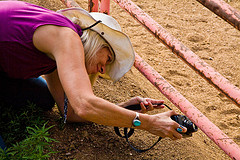Corey Haines did not write anything about convincing management in his Journeyman blog back in 2008. Earlier this year I sent him an email asking for an advice. Although I believe Corey is a busy man, he answered my question. Here is what he wrote:
I'm afraid that I don't have a lot of advice on pre-selling the idea to management. I stayed away from companies that had trouble figuring out the value of having me there. Especially at the beginning, a lot of companies were a bit worried about the idea of having someone in. I just started without them. One major advice I have that is based on my experience is to just start. I didn't really plan things out too far in advance, especially at the beginning. If you just start going to some of the places that you do know, then others might start to turn their attitudes around. Make sure that you blog, do videos, etc, to get the word out of what you are doing. That way, companies will have something to focus on when they are making the decision. (Corey Haines, private mail, 29th of July 2013)
 Start with companies who understand the idea.
Start with companies who understand the idea.So the first plan is not to convince management but just start with companies who understand the idea. This surely works if you travel a large enough area, as Daniel Temme's tour around Germany shows. So try to travel an area as large as possible.
Ask startups and small companies to host you.
As far as I noticed, small companies are more likely to host you. I started my tour with two startups, Blossom and letsplay.io because their founders just agreed to my visit without any questions. Especially the lean startup movement is open to the ideas of learning and continuous improvement. People running one-man businesses who are not permanently working at the customer's site seem to be more open to visits as well, e.g. Lunifera or sdguide.org.
Show that you are valuable.
As I want to stay in Vienna and the Journeyman concept is hardly known here, I have to convince some companies. Obviously there are benefits in having an outsider in your team for a few days. I start the "convincing" with describing my skills and enclose a current version of my CV that shows my experience and my willingness to teach, for example I list my talks at local user groups.
 An outsider has a fresh perspective.
An outsider has a fresh perspective.Even an outsider can provide valuable input. This is the main argument used by German coach Ralf Westphal who did a Journeyman tour this spring. This input might be some piece of code or just a second opinion during pair programming. As an outsider I am not affected by organisational blindness and can reflect on structures, assumptions, conventions and behaviour without adhering to company policy or any personal interests. I can share my views on coding, design, architecture, development process and anything I see during my visit. My host will benefit from my visit.
Help with Agile practices.
Related to a fresh perspective, I offer to help my hosts with Agile practices like TDD or pair programming. I will not run workshops or give polished presentations, but obviously I will practice with my pairing partner. I also offer to give a short presentation about the Journeyman concept and Software Craftsmanship in general which I have given several times since the beginning of my tour.
My friend Thomas Sundberg pointed out that managers of development teams who want to introduce pair programming or TDD into their teams should be interested in hosting Journeymen. By working closely with someone who has experience in pair programming, the developers will get a first impression of how it is done. This is especially valuable if they have absolutely no prior experience.
Knowledge is spread effectively using Pair Programming.
All the things said about outside view are even more true in the small world of a (programming) pair. As much as you hope to learn by pairing from a stranger, as much the stranger will learn from you. As the Code Cop I love unit testing and clean code. I do not know the domain I will be working in, but I know testing. My pair will know his or her domain, but maybe not how to create a good unit test, so we will work together on the domain with good tests. The same is true for clean code. One of my hosts invited me for exactly these reasons. The managers of the development department had tried to grow an atmosphere of professionalism and supported pair programming and TDD but the development culture had not changed. Of course my visit did not change it either, but at least I told the developers the same things their managers had been telling them and a few developers experienced these things while pair programming with me.
 Spread the word about your tour.
Spread the word about your tour.As Corey said in his email, it is crucial to show what you are doing. It probably helps if you are well known like Corey or Ralf, but it is not necessary. I did not write any technical books nor do I speak regularly at conferences. I just started my tour with writing about my idea and added smaller posts on the way. People who wanted to pair with me showed my blog to their boss to explain the concept. I got invited to Germany based on the fuzz I created on Twitter. You should tell everyone about your tour in advance, present it at local user groups. You need to do some marketing. For example Ralf Westphal had his tour published in a high-circulation developer magazine and got much more offers than he had planned for.
You need a champion vouching for you.
In my experience the most important fact is the "mole" inside the company. Someone who understands the idea and wants to work with you. In the end he or she has to convince management and possibly vouch for you to be admitted. This person is a like-minded individual, someone whom you know from user groups or conferences. Especially Craftsmanship related activities like Coding Dojos, Code Retreats or Software Craftsmanship conferences are the right place to meet these people. As Daniel Temme wrote, his tour was based on people he had met during the SoCraTes 2013 conferences a week before. Saying that it is high time to say a big thank you to all the people that believed in me and convinced their managers that I would bring value to their organisations. Thank you all, you rock!








No comments:
Post a Comment